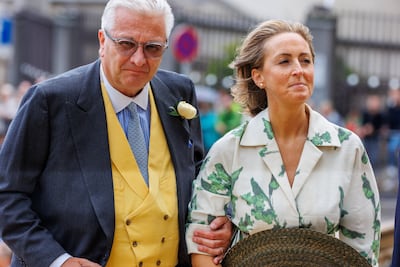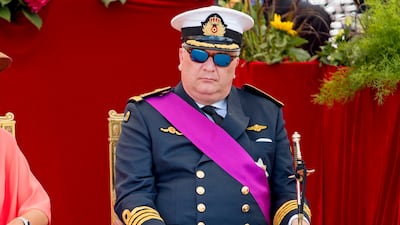A bitter dispute that has pitted a Belgian prince against the sovereign wealth fund set up by Libya's former dictator Muammar Qaddafi is to be settled by arbitration.
The Libyan Investment Authority (LIA) has launched proceedings against Belgium after about €15 billion of its assets were seized by a court in the country as part of a dispute with Prince Laurent.
Laurent, who was until recently the heir to the throne of Belgium, is seeking €67 million payment for projects undertaken by an NGO, Global Sustainable Development Trust (GSDT), aimed at reforesting desert regions of inland Libya.
A Belgian court seized €15 billion worth of the LIA’s funds as part of his claim. To retrieve its funds, the LIA has launched arbitration proceedings against Belgium at the International Centre for Settlement of Investment Disputes (ICSID), part of the World Bank.
William Kirtley, an international arbitration lawyer, told The National it is rare for sovereign wealth funds and other state-linked bodies to seek arbitration, rather than being on the receiving end of a claim.
“This is a very unusual case and the most interesting aspect of it is that it’s the Libyan Investment Authority doing this whereas these are the type of people who are usually attacked in international arbitration,” said Mr Kirtley, the managing partner of Aceris Law.
Mr Kirtley explained that the process of arbitration is similar to a court case and will take approximately three years.
He said at this stage the exact nature of the LIA claim in law is unknown, but he said he presumed it was on the basis of the bilateral investment treaty between Libya and Belgium under which the LIA would be alleging “unfair and inequitable treatment” as well as the “expropriation of assets”.
“They’re probably looking for a more neutral forum than the Belgian courts – they’ve probably lost confidence in the Belgian courts,” he said.
Prince Laurent, who is the younger brother of King Philippe and is married to the British-born Princess Claire, has been in the headlines for the wrong reasons over the years. He is sometimes called "le prince maudit", or “the cursed prince”, in Belgium.
His monthly allowance was docked by 15 per cent for a year in 2023 after he attended a reception at the Chinese embassy in full naval uniform without permission from the government. In 2015 he attacked the royal family and their entourage, saying they were like East Germany's Stasi secret police, and that they had sabotaged his career for years.

The dispute dates back to 2008 when the contract between the GSDT and Libya was first signed, but the project collapsed with the uprising against Qaddafi in 2011.
Prince Laurent, the king's brother, has been chasing the €37 million plus interest ever since – the figure has now reached €67 million and counting.
His clash with the Libyan Investment Authority stems from the sanctions brought by the UN against Libya as the uprising against Qaddafi began to gather pace.
The international community froze the $67 billion sovereign wealth fund’s assets to prevent them falling into the hands of the dictator or his supporters. The sanctions remain in place as the UN deemed the civil war that followed rendered the country too unstable for the funds to be used in the best interests of the Libyan people.
Assets that have been frozen under sanctions include a number of properties in London including crumbling office blocks in the city centre and apartments tucked away on leafy residential streets.
It emerged in 2015 that the Libyan Investment Authority had somehow been allowed to divert €2 billion in interest from €13 billion of funds frozen under sanction and held in the Euroclear clearing bank in Belgium.

Prince Laurent then requested a criminal inquiry against the LIA and the banks involved, regarding embezzlement, money laundering and criminal organisation in a bid to recover his money.
That resulted in an Interpol Red Notice being issued against Ali Mahmoud Hassan Mohammed, chairman and chief executive of the LIA, which was then lifted.
As part of the criminal case a Belgian court seized €15 billion worth of the LIA’s funds last July. The LIA hit back a few days later and filed a criminal complaint against Prince Laurent, accusing him of fraud and extortion linked to his bid to reclaim funds.
The Libyan Investment Authority was established in 2006 to manage the Libyan sovereign wealth fund, to protect and develop the value of the country's oil revenue reserves and to diversify the sources of national income away from oil.
The Colombian lawyer Eduardo Zuleta, a well known international arbiter, has been appointed as the presiding member of the panel in the case but no date has been set for the hearing.
The LIA and Belgium's foreign ministry, as well as lawyers for both parties, have been contacted by The National, but they declined to comment or did not respond.


